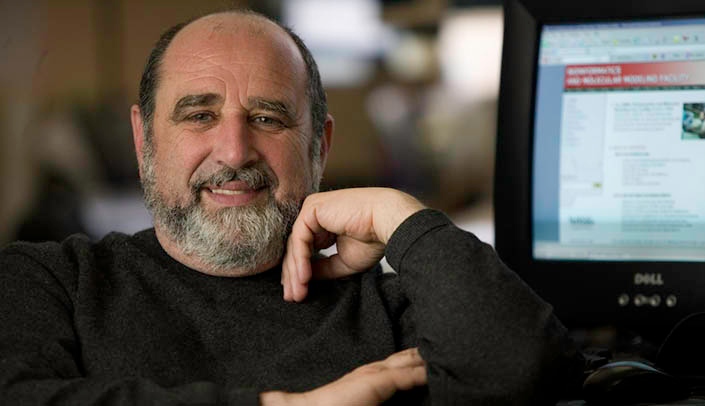After nearly 27 years at the Eppley Institute, Simon Sherman, Ph.D., will retire today as professor emeritus. A reception in Dr. Sherman’s honor will be held on Monday, March 4 at 2 p.m. on the ground level of the Fred & Pamela Buffett Cancer Center in Room 0.12.103.
Dr. Sherman joined the Eppley Institute in August 1992 as a research instructor. He was promoted to assistant professor in 1993, associate professor in 1998, and professor in 2002. In 2008, Dr. Sherman was recognized as a UNMC Distinguished Scientist.
His initial research at UNMC involved studies in structural biology and mathematical modeling. Since 2001, Dr. Sherman’s laboratory has focused on the developments of the integrated Cancer Data Repository for Cancer Research (iCaRe2), a web-based program for collection of data and bio specimens. Currently, researchers from 60 institutions in 23 U.S. states utilize iCaRe2. Standardized, multi-dimensional, longitudinal data on more than 16,000 subjects, and 90,000 biospecimens have been collected. The iCaRe2 fosters comprehensive studies of risk factors of cancer development and progression and enables the design of novel strategies for prevention, screening, early detection, and personalized treatment of cancer.
Dr. Sherman was instrumental in organizing the Nebraska Informatics Center for Life Sciences, which coordinated the efforts of many investigators from UNMC, the University of Nebraska-Lincoln and the University of Nebraska at Omaha. He also organized and coordinated the first bioinformatics workshop in Nebraska (2000), Bioinformatics Tracks of the Nebraska EPSCoR Conference (2002 and 2005), Bioinformatics Track of the Infotec Exhibition and Conference of the Nebraska EPSCoR Conference (2003 and 2004), and mini-tracks of the Informational Technology in HealthCare Track at the Hawaii International Conferences on System Sciences (from 2005 to 2010).
He currently serves on a special emphasis panel at the National Cancer Institute to review grant applications with the primary focus on developing informatics technologies for cancer research and surveillance (ITCRS). He also is working on several manuscripts on mathematical modeling of carcinogenesis.
“During more than 26 years of my work at UNMC, I acquired many friends and colleagues with whom I have extensively collaborated on many projects and published many articles,” Dr. Sherman said. “It was an amazing, memorable period of my life.”
